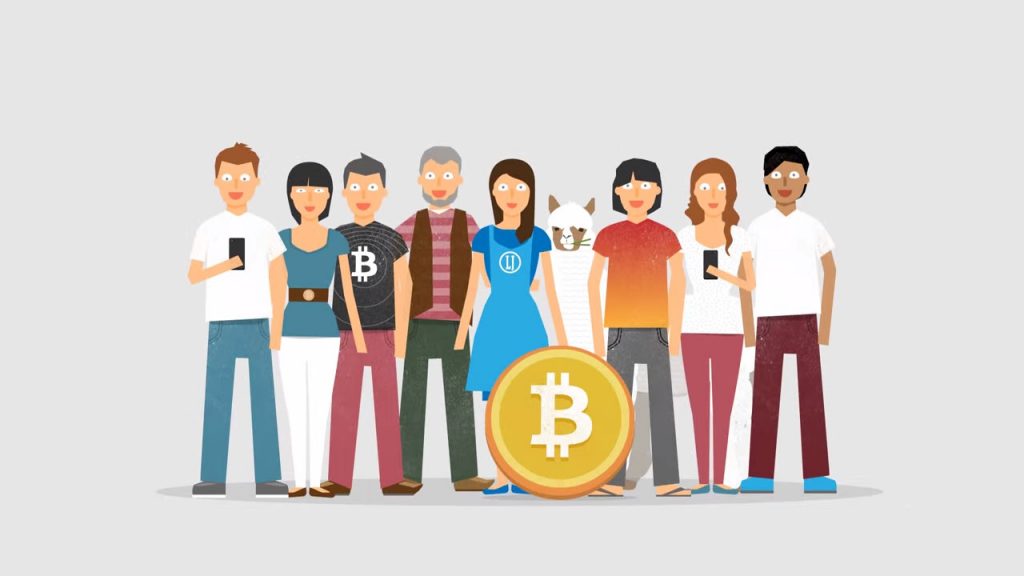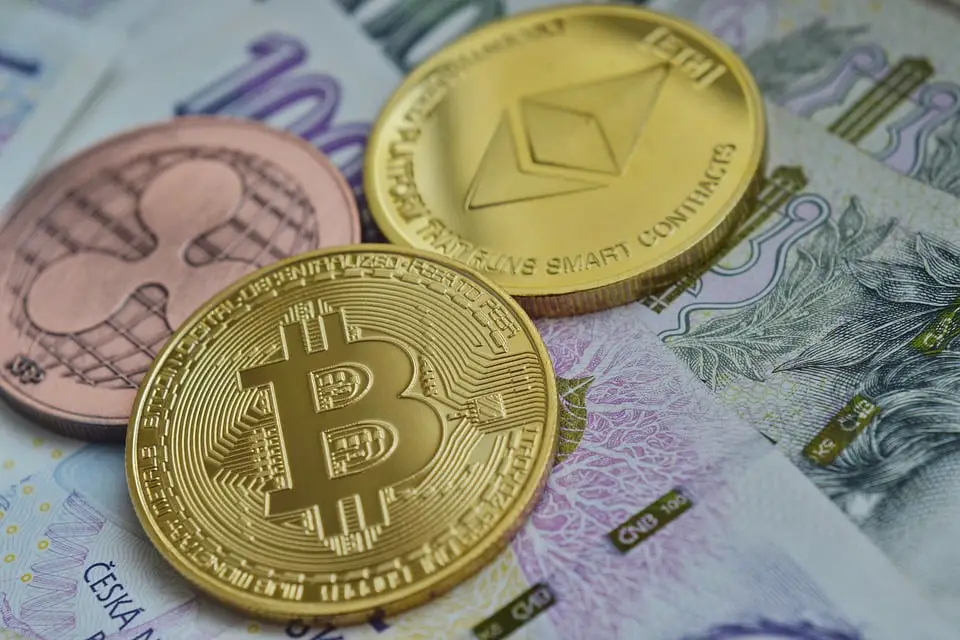There are many punters, renowned experts, who rely on the success of Bitcoin. A mixture of excitement and curiosity accompanies this world of cryptocurrency whose potential can as much increase in arrows as to go down at once. 8 years already since the release of Bitcoin. We are witnessing some people who accidentally bought bitcoins. Some have become millionaires or even billionaires, which deserves reflection. Bitcoin is considered tomorrow’s new cryptocurrency with immense potential.
It’s time to join the world of crypto-currencies. But first of all, you have to understand how crypto-currencies work, you’ll be fine by following this guide for beginner virtual currency: Bitcoin
What is Bitcoin?

Since the release of the open-source algorithm in 2009, Bitcoin has been considered the world’s first cryptocurrency. In addition, it is a digital currency whose existence is limited to electronic order passes.
Bitcoin is decentralized. Despite this, He is surprisingly organized. It has neither a central issuing authority nor political institution. Yet the amount of bitcoin in circulation is quite controlled.
The process of this system is quite simple: the transfer of bitcoins by their holders is via a peer-to-peer network. These transfers are tracked on the “blockchain”, a technology of storage and transmission of information without control organ. This is the giant book that records all Bitcoin transactions. For security reasons, each block in the blockchain consists of particular data structures based on encrypted Merkle Trees. It is therefore easy to detect fraud and corrupted files. Also, the blockchain can protect other general ledger files after identifying damaged files.
Instead of relying on a government to print a new currency, it is the programming of the blockchain that deals with the issue of new bitcoins, it is also part of the blockchain DNA the number of bitcoins that will be issued. The blockchain also tracks the location of bitcoins and ensures that transactions are accurate.
There are currently about 17 million bitcoins in circulation. There is no central regulator or government that controls the supply of bitcoins, which means that supply is controlled by the initial design of cryptocurrency. The total supply to be created is capped at 21 million bitcoins.
This cap raises the argument that Bitcoin might have scaling problems, this is called scalability. However, since Bitcoin is essentially infinitely divisible (that is, users can transfer as little as 0.00000001 bitcoins, this fraction is also called a Satoshi), this does not really create a problem of setting ‘ladder. The magical figure of 21 million is arbitrary. That being said, 21 million and not one more makes Bitcoin a purely deflationary currency. If everyone wants to have 1, there will not be for everyone, hence the price of Bitcoin.
It is believed that Bitcoin was designed to become a deflationary currency in order to combat the government’s use of inflation as a hidden tax to redistribute wealth earned. Many people congratulate Bitcoin for giving more power to the people by overthrowing the powers of politicians. In this way, transitional politicians will no longer have the power to print currency notes. If you want to buy Bitcoins for the first time, I recommend the Coinbase platform.
Coinbase is the world’s most popular platform for buying and selling bitcoins, ethereums and litecoins.
How does Bitcoin work?
One of the most appealing features of Bitcoin is its ruthless verification process, which greatly minimizes the risk of fraud. Since Bitcoin is decentralized, volunteers – called “miners” – constantly check and update the blockchain. Once a specific number of transactions is verified, another block is added to the blockchain and the activity continues normally to generate the next block.
Bitcoin Mining
Instead of a single central server that checks every transaction, virtually everyone on the network checks every transaction. These are the people we call Miners of Bitcoin.
To simplify things: minors are faced with a complicated mathematical problem and the first to solve the mathematical problem adds the verified block of transactions to the ledger of transactions. The calculations are based on a process called Proof Of Work (PoW), ie proof of actual work, or evidence that a minimal amount of energy has been spent to get a correct answer.

There are no real humans vaulted by computers with bits of notebook paper and calculators doing pre-calculation homework; the hardware is used to extract Bitcoin. When a minor makes the minimum calculations required, it proves that he spent a certain amount of time doing these calculations, then validating him as a minor and receiving a reward for that.
Bitcoin’s integrated reward system compensates minors who succeed with a fraction of bitcoins. The reward changes over time according to Bitcoin’s programming, and the offered bitcoins are halved about every four years. The current reward for each new block of verified transactions is approximately 12.5 bitcoins.
Processes for mining bitcoin have become increasingly sophisticated. The most common method uses ASICS (Application-Specific Integrated Circuits). ASICS are hardware systems similar to CPUs that are built solely for the purpose of extracting bitcoins.
Bitcoin mining operations require a lot of effort and power, and competition alone makes it difficult for newcomers to enter the race and make a profit. A new miner should not only have adequate computing power and the knowledge to use it to compete with established miners with phenomenal computing power, but he would also need considerable capital to finance operations.
Mining of Bitcoin in the cloud
Ongoing redaction …
Bitcoin Wallets: How to store its bitcoin in portfolios
It’s good, you are in possession of this digital currency. But you can not really throw it in your pocket. If you have a lot of them, you should think about keeping them safe. We will present the different ways to safely store its bitcoins. But let’s first review some useful definitions before embarking on the storage of cryptos:
- Exchange platform: This is the place where you exchange money for crypto-currencies such as Bitcoin, Ethereum or Litecoin. You can also exchange one cryptocurrenye for another.
- Wallet platform: These are wallet-platforms, essentially a bank account where your cryptographic currencies are kept.
- Hard Wallet: Hard wallet are “offline” wallets that are not connected to a network.
- Public Key: The “public key” is your account number. Similar to how someone would send money to your bank account via your account number, your public key is the information you give someone to receive cryptos.
- Private Key: The “private key” is what allows you to access your wallet and allows you to spend your Bitcoins and other crypto-currencies. It is absolutely necessary to keep this for you and that it remains private and secret. If anyone has access to it, they can transfer (steal!) Your bitcoins. You will have been warned.
Now that it’s settled for the basic definitions, we can calmly tackle the bitcoin wallets section.
When you hear about pirated bitcoins, you probably hear about a pirated “trading platform”. As the structure of the Bitcoin block chain makes it EXTREMELY difficult to hack (almost impossible), it is considered very secure.
However, the exchanges are another story. The hack of a most notable bitcoin trading platform may have been the Tokyo-based MtGox hack in 2014, where 850,000 bitcoins worth more than $ 350 million (at that time) suddenly disappeared from the platform. This does not mean that Bitcoin itself has been hacked, but simply that the trading platform has been hacked. Imagine that a bank in Paris is burglarized: the euro has not been stolen, the bank has been.
The industries surrounding Bitcoin are new and are not devoid of their particularities. Marc Andreessen, Bitcoin’s lawyer and prominent venture capitalist, said:
MtGox had to die for Bitcoin to prosper. Its former role since the beginning of Bitcoin has been supplanted by better and stronger entities.
Even though most portfolio platforms are considered extremely safe, the prospect of hackers makes many users paranoid.
It is this concern and lack of confidence in Bitcoin trading platforms that brings us to solid or hard wallet portfolios. A rigid wallet is essentially a USB key that allows users to store their private keys (thus their bitcoin wallet) offline and out of trade. Your private key only lives on your hard wallet and can not be hacked (unless someone physically.
Hard wallets are so secure that there are countless stories of people carelessly mislaying a rigid wallet full of cryptos that can never recover thousands, hundreds of thousands or millions of crypto coins.
Some users choose to use a “paper wallet” or wallet paper, which is essentially your private keys on a piece of paper stored in a safe place like a bank vault. Although paper wallets are not recommended, they can be made by an online key generator (not recommended due to malware threats) or handwritten.
For more information on Bitcoin wallets, check our guide to find the best bitcoin wallet.
Why use bitcoins?
Bitcoin is often portrayed as the future international currency that will take over all other fiduciary currencies.
- Bitcoin is decentralized . this currency gives power back to the very people who use it because a bank or entity does not control it. Launched barely a year after the financial crises of 2008, Bitcoin has attracted many people who see the current financial system as unsustainable. This factor has won the hearts of those who see politicians and the government with suspicion. It is not surprising that there is a huge community of ideologues actively involved in building, buying and promoting this cryptocurrency in the world.
- Freedom of action without borders . The idea that one could transport millions or billions of dollars in bitcoin across borders, pay anything at any time and not have to wait for extended banking delays is a major selling point .
- Security . Bitcoin payments do not necessarily need to be related to your personal information. Since personal information is excluded from transactions, users are not as exposed to threats as identity theft. Bitcoin can also be backed up and encrypted to ensure the security of your money.
- Low transaction fees . Banks and companies like PayPal charge to send and receive money. Bitcoin replaces the 2.5% “transaction fee” by an amount that is only a fraction of that amount.
- The big accounting book . The public register of Bitcoin is objective (ledger). People believe that it is just because it is based on pure mathematics, rather than on human error and the corruption of dubious politicians.
What are the disadvantages of bitcoin?
Despite all its advantages, Bitcoin still poses some important problems.
One of the main reasons why everyone has not jumped on the Bitcoin train is perhaps the uncertainty surrounding its price. Many people are worried about the very high volatility of cryptocurrency ….
- The legal vagueness around Bitcoin . Large governments have largely been sidelined, creating a sense of tremendous potential for supporters as well as apprehension for bitcoin detractors. Bitcoin is not supported by a regulatory agency and a government would technically give up power over its currency by supporting a decentralized currency. This issue has not been formally addressed. The price of Bitcoin, however, tends to be very sensitive to any news regarding the opinion of different governments around the world regarding cryptocurrencies. For example, when the US SEC refused in 2017 the approval of bitcoin-based exchange-traded products –essentially bitcoin-backed assets in the stock market – Bitcoin’s price has fallen by 18%. Yet, while the price and adoption of bitcoin would be influenced by government action, governments are not in a position to criminalize bitcoin. In fact, governments like the United States and China have certainly invested to some extent.
- Hackers . As noted above, a stock market piracy has nothing to do with the integrity of the Bitcoin system … but the market still freaks out any attack on any platform. This trend seems to be minimizing as users find that cryptos are recovering from hackers. As trade evolves and becomes safer, this threat becomes less and less problematic. In addition, external investments channeled to Cryptocoins trading platforms provide them with the capital they need to grow stronger.
- Liquidity of bitcoin . This is especially questionable because of the market capitalization of Bitcoin which breaks records by the day, but it is still sweating its users. It is highly unlikely that the price of bitcoin will drop and you will not be able to do anything, but it is always troubling. However, as investors invest more, illiquidity becomes a negligible risk, as there will likely always be a buyer for bitcoins that want to be sold.
- Volatility of bitcoin . It is precisely for this reason that many speculators are attracted to bitcoin and that many potential users are reluctant to get involved. Users who regard Bitcoin as a speculative investment option are essentially playing on volatility, and the future price of bitcoin is largely unknown. According to some estimates, bitcoin will be worth a few cents in a few years, while others predict that a bitcoin will be worth $ 500,000 in three years. As new investors continue to invest and market capitalization increases, the price of Bitcoin may become more stable.
- No adoption of bitcoin by companies. Price volatility largely explains why many companies have not yet adopted bitcoin as a form of payment. Increased consumer adoption and price stability will eventually mitigate this disadvantage.
Another disadvantage is that while many people have heard of bitcoin, not many people understand exactly what it is or how it works. Guides like this one help to demystify bitcoin and build a foundation of understanding even if it remains basic, but it’s ultimately up to users to search for more information.
The strength of Bitcoin lies in its network effect. The more we spread the word and grow the Bitcoin fan community, the better our bitcoins will be
How to buy Bitcoin?
As mentioned above, in the early years of Bitcoin, it was difficult to find a trustworthy place to buy cryptocurrency. With the increasing demand for bitcoin , many new companies have emerged to facilitate the purchase of bitcoin.
Nowadays, many bitcoin exchanges have received huge investments from private equity investors. They are also now more heavily regulated, especially those based in the United States. You can compare the trading platform and view our extensive reviews in our Bitcoin Buying Guide. We have also listed below the two main recommended options.
Buy Bitcoin on Coinbase
Coinbase is launched in 2012 with the hope of giving users an easier way to buy Bitcoin. Since its launch, the San Francisco-based startup has become the most frequently recommended purchase option for beginners. For more information, see our Coinbase User Guide.

Who invented Bitcoin?
Satoshi Nakamoto is credited with the design of Bitcoin. Nakamoto claims to be a living man in Japan born on April 5, 1975, but there is speculation that he is in fact either an individual programmer or a group of programmers with a penchant for scattered computing and cryptography in the United States or in Europe. Nakamoto is believed to have created the first blockchain database and was the first to solve the problem of double spending. This is the problem that other digital decentralized currencies had always failed to solve before. While the creator of Bitcoin is surrounded by mystery, his status as a Wizard of Oz has not prevented the digital currency from becoming more and more popular with individuals, businesses and even governments.
Bitcoin Popularity

It’s important to take a look at the popularity of Bitcoin over time because … well, take a look below:

Google Trends structures the chart to represent a relative search interest at the highest points of the chart. A value of 100 is the most popular for the term “bitcoin” and a value of 50 means that it was half as popular at that time. A score of 0 indicates that the term was less than 1% as popular as the top. It is amazing how bitcoin research has peaked in recent times.
When Bitcoin started circulating in 2009, its early followers were programmers and a host of specialized technicians. Its popularity over time indicates that many of the disadvantages of bitcoin will likely dissipate as bitcoin becomes more standard.
Look again at the graph below, which reflects the price of the precious bitcoin but also the volume of exchanges (buying and selling) Bitcoin continues to grow.
As expected, the price of bitcoin has risen as demand has increased. As you can see, more and more buyers are entering the market and increasing the price as people learn more about Bitcoin and its technical applications.
The popularity of Bitcoin has undeniably been its number one advantage over the many other cryptocurrencies we call altcoins. By winning a large number of followers and users, Bitcoin has achieved a network effect that attracts even more users. Users who would otherwise be more concerned about investing in a relatively unknown and unproven digital currency are reassured by Bitcoin’s performance over time, its growing community and the fact that the people they know are adopting more and more Alternative currency cryptos make overall all altcoins climb as well.
The advantage, popularity and network effect of the first numeric coin Bitcoin cemented it as the most popular cryptocurrency with the largest market capitalization. Rivals like Litecoin may have many technical advantages over the Bitcoin algorithm (see our Bitcoin VS Litecoin page ), but they only hold a fraction of Bitcoin’s market capitalization and their declining communities are largely composed of part of anti-Bitcoin loyalists, speculators and counter-buyers.
What can we learn from the popularity of Bitcoin
Understanding what makes Bitcoin so popular allows us not only to conceptualize where Bitcoin is headed, but also how other crypto-currencies work and the challenge. Here’s why Bitcoin is able to attract as many followers as any other cryptocurrency:
- It has the network effect. The Bitcoin network validates its value among newcomers and gives Bitcoin a viral growth rate.
- The strong market capitalization of Bitcoin is reassuring. The huge market capitalization of Bitcoin gives users a sense of security and stability. With a market capitalization of around $ 69 billion, Bitcoin is comparatively a much safer digital investment.
- Speculation makes a lot of noise. Many bitcoin users are clinging to their bitcoins in hopes of selling them back one day for a huge profit. You can not really blame them for stories that describe Bitcoin millionaires as lucky kids who arrived early. For example, if instead of spending $ 5 for a latte instead of buying 2,000 bitcoins on a morning in 2010, they would be worth about $ 5.4 million today. It really makes you want to better manage your Starbucks budget, does not it?
- News attracts attention and understanding. While many people have flocked to cryptocurrency purely in search of financial gain, there are a ton of people who are simply curious. Some people stay in the corner and try to understand what cryptocoins are. As more users increase the network effect of Bitcoin, more people forming a deep understanding of cryptos also strengthens the active Bitcoin community.
Understanding bitcoin in video
Our conclusion on Bitcoin
Bitcoin is still a relatively young currency, but has enjoyed significant adoption and growth by users. The Bitcoin network is only getting stronger as people learn more about the fundamental technology and potential of Bitcoin and its blockchain compared to other value storage methods.
As flagship of the crypto-currency fleet, Bitcoin is considered the “gateway” to the cryptocurrency. Understanding the potential of Bitcoin is an essential first step to seeing the brilliant solutions that we are working on in the world of blockchain and cryptocurrency.
Bitcoin paints a radically different future from today’s world of fiduciary money. It is either exciting or disturbing for the vast majority. Equip yourself with the best resources possible. Become active in communities that further explore not only the technical applications of Bitcoin and other corners, but also their global potential to disrupt virtually any market. Prepare yourselves. Cryptocurrency is coming.















